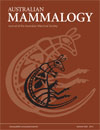
AUSTRALIAN MAMMALOGY
Scope & Guideline
Unveiling the Wonders of Australian Mammalian Fauna
Introduction
Aims and Scopes
- Conservation Biology and Management:
The journal emphasizes research that informs conservation strategies for threatened and endangered species, including studies on population dynamics, habitat use, and the effects of invasive species. - Ecological and Behavioral Studies:
Research focused on the ecological roles and behaviors of Australian mammals, examining aspects such as social structures, foraging strategies, and reproductive patterns. - Impact of Environmental Changes:
Studies investigating how climate change, habitat destruction, and other anthropogenic factors affect mammalian populations and ecosystems. - Methodological Innovations:
The journal promotes the development and application of new research methodologies, such as remote camera trapping, telemetry, and genetic monitoring, to enhance the study of mammals. - Community and Citizen Science:
Inclusion of research that engages local communities and citizen scientists in wildlife monitoring and conservation efforts.
Trending and Emerging
- Impact of Climate Change:
There is a growing emphasis on understanding how climate change affects mammalian species, particularly regarding their distributions, behaviors, and habitat use. - Reintroduction and Translocation Studies:
Research focused on the outcomes of reintroduction efforts for endangered species is increasingly prominent, highlighting the importance of practical conservation applications. - Community Engagement in Conservation:
Emerging studies highlight the role of community involvement in conservation efforts, using citizen science to gather data and raise awareness about local mammalian populations. - Technological Advancements in Monitoring:
The use of innovative technologies such as drones, automated cameras, and genetic tools for monitoring wildlife is on the rise, improving data collection and analysis. - Human-Wildlife Interactions:
Research exploring the impacts of human activities on wildlife, including roadkill and habitat fragmentation, is becoming more common as conservationists seek to mitigate negative effects.
Declining or Waning
- Historical Ecological Studies:
Research focused on historical baselines and ecological changes over time is becoming less frequent, possibly due to a shift towards immediate conservation concerns and applied research. - Non-native Species Impact Studies:
While still relevant, there has been a noticeable decrease in publications specifically dedicated to the impacts of non-native species on native mammals, suggesting a potential shift toward integrated approaches that consider broader ecological contexts. - Behavioral Studies of Common Species:
Research on the behavior of more common mammalian species appears to be declining, as the focus shifts to threatened species and those with unique ecological roles. - Morphological Studies:
Research centered on the morphology of mammals, while still important, is less frequently published, indicating a possible preference for studies with direct conservation implications.
Similar Journals
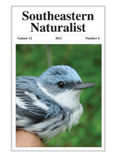
SOUTHEASTERN NATURALIST
Nurturing Sustainable Practices through Scientific InquirySOUTHEASTERN NATURALIST, published by the esteemed Eagle Hill Institute, serves as a vital resource in the fields of ecology, evolution, behavior, and systematics. With an ISSN of 1528-7092 and an E-ISSN of 1938-5412, this journal has been contributing to scientific discourse since 2002 and continues to provide insight into the intricate dynamics of southeastern ecosystems. While it currently holds a Q4 ranking in its category, the journal is committed to fostering research that advances understanding in its specific regional context, making it a unique platform for scientists interested in biological diversity and conservation issues relevant to the southeastern United States. Although it does not offer open access, researchers and institutions can subscribe to gain full access to cutting-edge research articles and reviews that highlight both multidisciplinary approaches and community-based studies. By bridging local ecological knowledge with broader evolutionary theories, SOUTHEASTERN NATURALIST appeals to a diverse audience, including researchers, conservationists, and students dedicated to ecological integrity and sustainable practices.

Avian Biology Research
Unveiling the wonders of avian life.Avian Biology Research, published by SAGE PUBLICATIONS LTD, is a leading journal dedicated to advancing the study of avian species through high-quality, peer-reviewed research. With an ISSN of 1758-1559 and an E-ISSN of 1758-1567, this journal has established itself as a vital resource within the fields of Animal Science and Zoology, as well as Ecology, Evolution, Behavior, and Systematics. The journal is currently ranked Q3 in both categories according to the 2023 release of the category quartiles, and it contributes significantly to the global understanding of avian biology, including behavior, physiology, and conservation efforts. Positioned within the competitive landscape of the Scopus rankings, it finds itself amidst a diverse array of research, with medical and environmental implications. As an open-access journal, Avian Biology Research ensures greater accessibility to its contents, fostering disseminative opportunities for researchers, professionals, and students alike. With a publication window spanning from 2008 to 2024, it continues to be an invaluable platform for the dissemination and dialogue of avian research, thereby enlightening future inquiries and driving scientific advancements in this crucial area of biology.
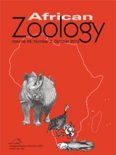
AFRICAN ZOOLOGY
Exploring Africa's Rich BiodiversityAFRICAN ZOOLOGY, published by Taylor & Francis Ltd, stands as a significant journal in the realm of Animal Science and Zoology, with a proud history dating back to 1996 and slated to continue until 2024. With an ISSN of 1562-7020 and E-ISSN 2224-073X, this journal provides a reputable platform for researchers and practitioners dedicated to the study of animal biology across the African continent. It has been recognized for its quality scholarship, evidenced by its Q3 categorization in the 2023 Scopus quartile rankings and an impressive rank of #182 out of 490 within its field. As an open-access journal, it facilitates the dissemination of vital research findings and promotes broader accessibility, catering to a diverse audience of professionals, scholars, and students alike. The journal aims to enhance our understanding of wildlife, conservation, and ecosystem dynamics in Africa, fostering collaborations that address critical ecological challenges. For researchers and enthusiasts keen on contributing to and staying informed about advancements in zoological science, AFRICAN ZOOLOGY is an essential resource that enriches the global discourse on biodiversity and conservation efforts.

Journal of Vertebrate Biology
Connecting researchers to the world of vertebrate studies.Journal of Vertebrate Biology, a reputable publication established by the Institute of Vertebrate Biology in the Czech Republic, serves as a vital platform for research across the fields of Animal Science and Zoology, Aquatic Science, and Ecology, Evolution, Behavior and Systematics. With its ISSN 2694-7684 and a commendable 2023 Q2 ranking in multiple categories, this open-access journal embraces innovative scientific inquiry and fosters academic discourse. The journal's commitment to disseminating high-quality research is reflected in its Scopus rankings, positioning it within the top quartile in several impactful areas. As it continues to converge its focus until 2024, researchers, professionals, and students alike are encouraged to engage with cutting-edge studies that advance our understanding of vertebrate biology. This publication stands out not only in its scholarly contributions but also in enhancing global awareness of biodiversity and conservation issues.
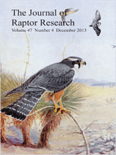
JOURNAL OF RAPTOR RESEARCH
Pioneering Research for Avian ConservationJOURNAL OF RAPTOR RESEARCH, published by Raptor Research Foundation Inc, serves as a pivotal platform for disseminating research related to the biology and conservation of raptors. Established in 1990, this esteemed journal has consistently contributed to the field of Animal Science and Zoology, securing a Q2 ranking in the 2023 category quartiles on Scopus, which highlights its significant impact and relevance. With an ISSN of 0892-1016 and an E-ISSN of 2162-4569, the journal presents an extensive range of studies aimed at promoting the understanding and preservation of these majestic birds of prey. Researchers, conservationists, and students alike will find invaluable insights and peer-reviewed articles that address current conservation challenges, ecological dynamics, and the latest methodological advancements in the study of raptors. Although not open access, the journal is integral for anyone dedicated to advancing the knowledge and appreciation of avian species in ecological and conservation contexts.

ACTA ZOOLOGICA BULGARICA
Fostering Knowledge in the Heart of Animal SciencesACTA ZOOLOGICA BULGARICA is a prominent academic journal dedicated to advancing knowledge in the fields of Animal Science, Zoology, Aquatic Science, Ecology, Evolution, Behavior, and Systematics. Published by the Institute of Zoology, Bulgarian Academy of Sciences, this journal serves as an invaluable platform for researchers, professionals, and students to disseminate their findings and engage with contemporary issues in biodiversity and ecology. With an established history since its convergence in 2010 and an ongoing publication schedule through to 2024, the journal holds a Q4 category ranking in multiple disciplines, highlighting its role in fostering scholarly communication in these areas despite its recent entry into Scopus-indexed rankings. Although currently not an open-access journal, ACTA ZOOLOGICA BULGARICA remains a key resource for those interested in the latest research and developments, particularly within the ecological and zoological landscapes of Europe and beyond.

Neotropical Biology and Conservation
Fostering Dialogue for a Greener TomorrowNeotropical Biology and Conservation, published by Pensoft Publishers, serves as a pivotal platform for researchers and professionals dedicated to the understanding and preservation of biodiversity in the Neotropical region. This Open Access journal, operational since 2006 and based in Brazil, invites contributions that delve into the complexities of ecology, evolution, and conservation strategies pertinent to the diverse ecosystems of South and Central America. With a commendable 2023 impact factor reflected in its Q3 rankings across multiple categories including Animal Science, Ecology, and Plant Science, it stands as a valuable resource for academics seeking to publish innovative findings and foster dialogue in these critical areas of study. The journal's commitment to open access ensures that knowledge is readily available to anyone interested in advancing the field of neotropical biology and conservation. Join the global conversation and contribute to the vital work of preserving our planet’s rich biological heritage through rigorous research published in this esteemed journal.

AMPHIBIAN & REPTILE CONSERVATION
Empowering Conservationists with Open Access KnowledgeAMPHIBIAN & REPTILE CONSERVATION, published by the Amphibian Conservation Research Center & Lab, is a leading journal dedicated to the field of herpetology and environmental conservation. With an ISSN of 1083-446X and an E-ISSN of 1525-9153, this journal serves as a vital resource for researchers, conservationists, and students interested in the preservation of amphibian and reptile species. The journal has achieved remarkable rankings, categorized in the Q2 quartile for Animal Science and Zoology, Ecology, and Nature and Landscape Conservation as of 2023, reflecting its significant contribution to the scientific community. Over the converged years from 2016 to 2024, the journal has established itself as an integral platform for disseminating research findings, fostering collaboration, and enhancing the understanding of biodiversity and ecosystem dynamics. By embracing an open-access approach, AMPHIBIAN & REPTILE CONSERVATION ensures that critical research is readily available to a global audience, promoting informed conservation efforts and policy advocacy to safeguard these vital species amidst their declining populations.
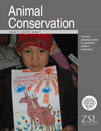
ANIMAL CONSERVATION
Advancing Knowledge to Safeguard Our Planet's Biodiversity.Animal Conservation is a prestigious journal that serves as a vital platform for the dissemination of research dedicated to the preservation of wildlife and habitats. Published by Wiley, this journal has established a significant presence in the fields of Ecology and Nature and Landscape Conservation, holding a distinguished Q1 category ranking for both in 2023. With an impressive Scopus rank of #25 in the realm of environmental science, it caters to a global audience keen on understanding and addressing pressing conservation issues. The journal provides researchers, professionals, and students with high-quality, peer-reviewed articles that explore innovative methods and strategies in animal conservation. With its continuous publication since 1998, encompassing a comprehensive range of topics, Animal Conservation is indispensable for anyone aiming to make impactful contributions to the field of ecology and conservation biology.
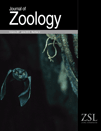
JOURNAL OF ZOOLOGY
Fostering understanding of wildlife and ecological challenges.JOURNAL OF ZOOLOGY, published by Wiley, stands as a premier scholarly journal in the fields of Animal Science and Zoology, renowned for its outstanding contributions to the knowledge of animal biology and ecology. With an impressive impact factor and a strong ranking in the Q1 category for Animal Science and Zoology, as well as Q2 for Ecology, Evolution, Behavior, and Systematics, the journal rigorously engages with both foundational research and groundbreaking discoveries since its inception in 1830. Located in Hoboken, New Jersey, this journal is dedicated to fostering the academic community's understanding of zoological sciences, providing access to important research that shapes wildlife conservation efforts and ecological studies. Although the journal does not currently offer open access options, it continues to attract significant attention, as evidenced by its strong Scopus rankings in related categories. Researchers, professionals, and students will find invaluable resources in the JOURNAL OF ZOOLOGY to advance their understanding of animal life and the ecological challenges it faces today.